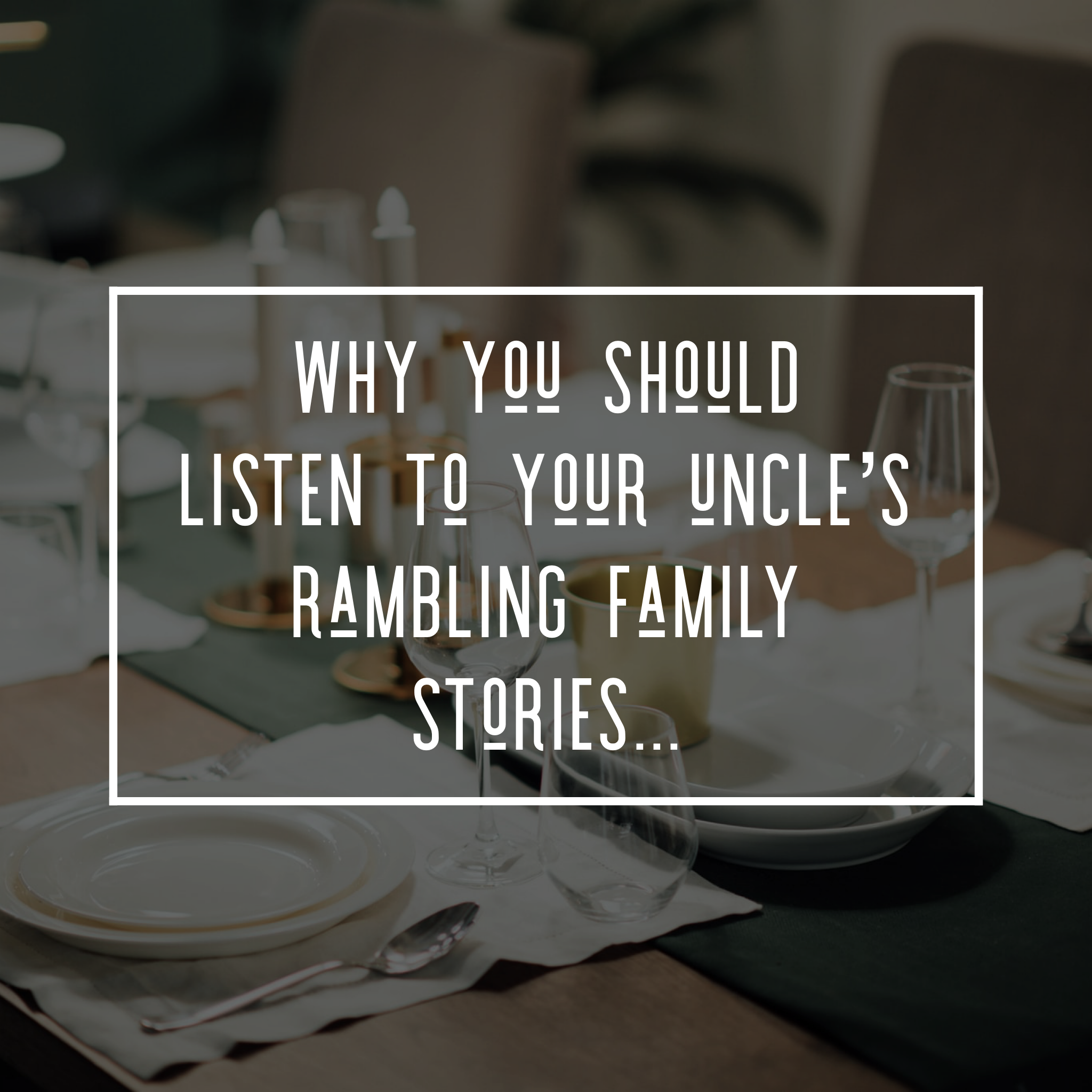As a boy, I spent hours and hours listening to my grandmother tell family stories about her childhood.
She told me about my great-grandmother and the obstacles she faced as a woman who was committed to sharing the gospel. I heard about prayers she’d seen answered and miracles performed. I can still hear her voice in the back of my mind, recounting tales of “Uncle Jacky”, “Ol’ Laura”, and dozens of others.
Those stories left me inspired and they reminded me that I’m part of something larger than myself.
So, when I saw ‘The Secret Benefits of Retelling Family Stories’ in a recent issue of the Wall Street Journal… I was intrigued.
Apparently, research has shown that there are very real benefits to telling and retelling family stories.
Mental Health Benefits of Family Stories
One of the stories I heard growing up was how my great-grandmother struggled with dementia over the last few years of her life. I can still recall my mother wondering whether God allowed her to go through that so she wouldn’t have to see the way some of her offspring wandered into destructive habits and ways of life during that time.
Toward the end of my teenage years, I watched my grandmother go through the same thing. And though it was sad to see her mind fading, those years were a source of countless stories that I could retell – some sad and some hilarious.
Mental health issues have been an undeniable (and unfortunate) part of my family’s story.
Maybe that’s why it was encouraging to find out that retelling family stories can benefit our mental health.
Research has shown that children who heard stories about their family from parents and grandparents experienced less anxiety and fewer behavior problems as teenagers.
I can’t imagine how much anxiety I’d have if I hadn’t heard all those stories from my grandmother and mother!
Social & Academic Benefits of Family Stories
But hearing family stories doesn’t just help with our mental health. Another study showed that “children whose parents explained negative emotions and how they resolved them had better social and academic skills.”
And this makes perfect sense, doesn’t it?
When we tell stories, we are communicating messages about how we ought to act, how to deal with problems, how to persevere, and so much more. If this is true of fiction, how much more is it of the stories that come from our own lives?
As you tell your children about the way you met your spouse or about how you dealt with setbacks in your career, you are equipping them to make better decisions.
You’re helping them avoid the pitfalls you fell into. And you may even inspire them to make decisions they otherwise wouldn’t.
Inspirational Benefits of Family Stories
That Wall Street Journal article recounts how a woman named Cynthia Blakelely used her mother’s story as a catalyst to write a new chapter in her own…
Her mother, a seamstress and waitress, overcame her anxiety as well as other obstacles and attended college in her 50s. Then, she spent her later years – years when many people would be enjoying retirement – finding fulfillment in a new career as a social worker.
This story led her daughter, Cynthia, to quit her job and begin working from home while her daughter was young so she could spend more time with her. Her mother’s story had taught her the valuable lesson that our careers don’t have to be a straight line. We can change things up and take risks.
I’m sure if you reflected on some of the stories you heard growing up, you’d discover that they’ve inspired you and informed your life in ways you previously hadn’t considered.
But this is the power of story – even the kinds of stories that come out of our life experiences.
But Are They Even Listening?
So, I know what you’re thinking.
If you’ve ever sat around the table at Christmas, chewing on a turkey leg while Uncle Jacky tells about the time he nearly got killed the first time he rode a motorcycle, you’re saying to yourself, “I’ve watched the teenagers in my family and they are not even slightly interested in hearing these ‘stories.’ They’re a million miles away on their phones.”
And that may be true. But they’re likely absorbing more than you realize. A 2018 study at Emory found that “more than 90% of teenagers and young adults can retell family stories when asked, even if they seemed uninterested when the stories were told.”
So, don’t get discouraged if the kids don’t seem engaged. Because there’s a good chance that when they’re facing a similar situation, your experience will come to mind.
Putting it into Practice
- Reflect on the stories you heard growing up as well as your own experiences.
- Consider the lessons that you learned.
- Find the plot in the story.
- Write the story and then perform a reading at your next family gathering.
“A good place to start is to ask yourself, ‘If I had to leave my children with one or two stories, which ones would I want them to know?’”
Weekend Writing Prompt:
Think back to a particularly meaningful moment in your life – a moment that helped shape you into the person you are today.
Use 500-1,000 words to retell this story in a way that would hold an eight-year-old’s attention. When you finish, post it in the comments below.

